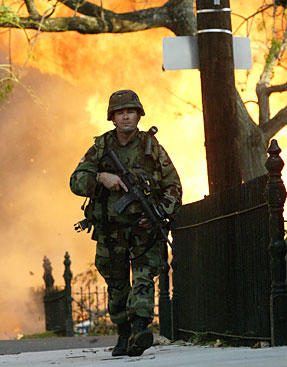Fire becomes the new enemy


By Michael Christie in New Orleans
September 07, 2005
FIRES raging across New Orleans have hindered efforts to find both those people who survived Hurricane Katrina and the thousands feared dead in a disaster that has shaken America.
Black smoke billowed across the sky from several building fires, and the city mayor pleaded with survivors who insist on staying in their homes to get out immediately.
"It is a health risk," Mayor Ray Nagin said.
"There are toxins in the water, there are gas leaks where we may have explosions. We are fighting at least four fires right now and we don't have running water. It is not safe."
Oil floating on the toxic waters could mingle with flaming gas leaks. After days of broken promises, aid efforts have picked up and water is being pumped out of the city after the US Army Corps of Engineers plugged a major gap in levees overwhelmed when Katrina tore in.
Flood levels in some areas were said to have dropped by 30cm, but it will still take weeks to dry the city out.
Rescue teams expect to find thousands of bloated bodies once the flood waters have been pumped out.
A full eight days after Katrina tore in, sending deep floodwaters from Lake Pontchartrain cascading into the home of jazz and Mardi Gras, very few bodies have been recovered.
Louisiana's official death toll stands at just 71 but authorities say that will climb into the thousands. In neighbouring Mississippi, 170 people have been confirmed dead, but many more are believed to have died.
Rescue teams sent dozens of boats and helicopters into flooded neighbourhoods to rescue remaining survivors, while helicopters dropped water onto building fires.
In drier areas, rescuers offered residents food if they agreed to be evacuated.
"These are people who tried to stick it out but time and a lack of food has worn them down. So we are using food to lure them out," Texas fireman Brady Devereaux said.
Warren Champ, 50, who took up an offer of food after toughing it out at home with his wife for eight days, said: "They said we have no choice. They said if we tried to stay, they will come back soon and force us out."
Mr Champ and about 30 other residents were then put on a government bus for evacuation after first being patted down for weapons.
New Orleans' famous French Quarter has become a militarised zone, with 82nd Airborne Division troops patrolling in formation, road blocks set up, and Texas sheriffs in cowboy hats riding on horseback through streets that used to host some of the most famous outdoor parties in the US.
It was a clear show of force to criminal gangs that ran wild, looting and shooting, in the days after Katrina.
Now that floodwaters have receded, the French Quarter looks remarkably unscathed compared with the misery seen in the rest of the city because it lies on relatively high ground.
More than a million people may have been driven from their homes across the affected Gulf Coast region - many perhaps permanently - with hundreds of thousands taking refuge in shelters, hotels and private homes across the country following one of the country's worst natural disasters.
Firefighters said the flooding made it tough to tackle the fires breaking out around the city, and the blazes were in turn taking crucial resources away from rescue efforts.
Fires had been caused by people using candles in the old, wooden buildings of many New Orleans neighborhoods, they said.
"Of course we're using candles," said Junior Jones, 71, whose house in central New Orleans was on fire.
"What else we gonna do? We got no electricity."
He said he had not evacuated from New Orleans because: "I'm sick, in a wheelchair. I could hardly walk. Where am I going to go?"
Vietnam War veteran Errol Morning, 60, was also in an obstinate mood.
"Man, they ain't taking me nowhere, man," he said. "I'm sleeping on other people's porches. I don't care how long it takes so long as I have me something to eat."
Botched Rescue
Bungled rescue efforts in the first days of the crisis and a slew of dramatic images that made New Orleans look more like the scene of a Third World refugee crisis have touched off a political crisis for US President George W. Bush.
Mr Bush said he would lead an investigation to find out what happened with the emergency operation, but he resisted growing demands for an immediate probe.
"There will be ample time for people to figure out what went right, and what went wrong. What I'm interested (in) is helping save lives," he said.
The New York Times said the Bush Administration was orchestrating a campaign to deflect blame to state and local authorities, which White House communications director Dan Bartlett denied.
US Senator Trent Lott, a Republican from Mississippi who lost his coastal home in the storm, said Federal Emergency Management Agency Director Michael Brown's job was in jeopardy.
"If he doesn't solve a couple of problems that we've got right now he ain't going to be able to hold the job, because what I'm going to do to him ain't going to be pretty," Senator Lott said on CBS.
Aaron Broussard, president of Jefferson Parish outside New Orleans, asked for Congress to investigate the botched rescue.
"Bureaucracy has murdered people in the greater New Orleans area and bureaucracy needs to stand trial before Congress today," he said on the CBS Early Show.
"Take whatever idiot they have at the top, give me a better idiot. Give me a caring idiot. Give me a sensitive idiot. Just don't give me the same idiot."
US oil prices meanwhile fell as industrialised countries prepared to release oil from emergency stocks and some US refineries began to resume operations.
Link Here




0 Comments:
Post a Comment
<< Home